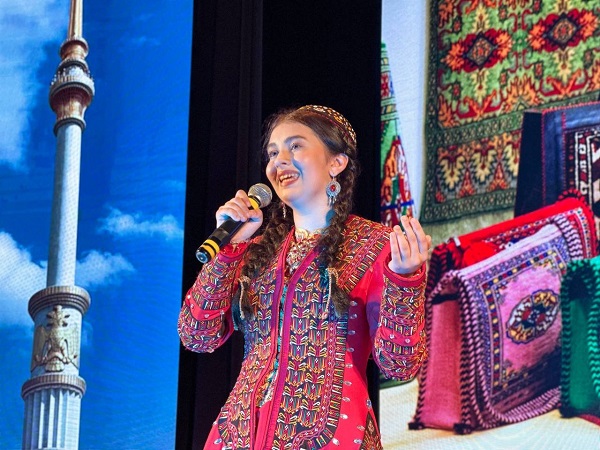The Republic of Belarus is hosting the “Children of the Commonwealth of Independent States” forum, bringing together young delegates from Armenia, Belarus, Kazakhstan, Kyrgyzstan, Russia, Tajikistan, Turkmenistan, and Uzbekistan.
Organized by the Interparliamentary Assembly of the CIS and the Council of the Republic of the National Assembly of the Republic of Belarus with support from the Interstate Fund for Humanitarian Cooperation of CIS Countries, the event will run through July 16.
On 13 July, the Turkmenistan delegation introduced their country, sharing its cultural heritage and traditions. Forum guests sampled traditional Turkmen sweets, listened to melodies played on national instruments, and crafted memorable souvenirs with their own hands, each reflecting the unique spirit of Turkmenistan.
The day culminated in a concert featuring Turkmen style performances: students delivered vibrant dances and heartfelt songs that immersed the audience in the richness of their folk legacy.


In his address, the Ambassador of Turkmenistan to Belarus, Mr. N. Shagulyyev, spoke about Turkmenistan’s cultural values and the country’s international initiatives. He highlighted that the designation of 2025 as the International Year of Peace and Trust coincides with the 30th anniversary of Turkmenistan’s declaration of Permanent Neutrality. The Ambassador emphasized the importance of nurturing youth in a spirit of friendship and respect for cultural diversity, expressing confidence that such initiatives contribute to strengthening cooperation among Commonwealth nations.
Earlier, forum participants received a greeting from the Chaiк of the Mejlis of Turkmenistan, Dunyagozel Gulmanova, who emphasized the importance of fostering humanitarian ties and cultivating among youth a sense of solidarity and belonging to the shared cultural heritage of CIS nations.
“This date holds particular significance in the patriotic upbringing of youth, strengthening respect for the valor of ancestors, and preserving and passing on historical memory from generation to generation. The forum offers a unique opportunity to reflect on shared chapters of history and to nurture a sense of belonging and pride in the spiritual and heroic legacy of our peoples,” the message reads.
Alongside the main forum sessions, the Days of other Central Asian countries—Kazakhstan, Kyrgyzstan, Uzbekistan, and Tajikistan—were held on the sidelines, offering a kaleidoscope of scenes from the region’s cultural life.
Participants from Tajikistan presented an exhibition showcasing jewelry, traditional headgear, precious stones, and folk craft items.
Forum attendees were introduced to the Tajik wedding ritual: on the night before the wedding, the groom visits the bride’s home, where she awaits him behind a “chadar,” a special curtain lovingly stitched by mothers for their daughters.
Representatives of Tajikistan also spoke about the national flatbread, kulcha. According to legend, during wartime women would tear off a small piece of this bread and ask their sons or husbands to bite it before leaving, thereby imbuing them with the hearth’s energy and ensuring their safe return.
The Kyrgyz Republic delegation familiarized students with Kyrgyz history, the music of composer Atai Ogonbaev, national dances, and the epic of Manas. The young participants tested their strength in a traditional tug-of-war game called “Arkan tartysh.”
Students from East Kazakhstan and Abai regions represented Kazakhstan’s cultural heritage. Forum guests were transported into the world of Kazakh customs, tried their hand at national games, and became acquainted with heroes of Kazakh legends.
Young representatives of Uzbekistan captivated their peers with vibrant performances, showcasing national dances, songs, and traditional games. Guests of the celebration were introduced to the doira—a traditional frame drum—immersed themselves in Uzbek poetry, and enjoyed samples of the country’s national cuisine.
The forum features an extensive program, including masterclasses in science and innovation, public speaking, and acting. Participants also have the opportunity to meet with Chair of the Council of the Republic of Belarus, heads of ministries, members of the National Academy of Sciences, and prominent figures in the arts and sports.
The agenda also includes a visit to the Khatyn Memorial Complex—a solemn tribute to the victims of the Great Patriotic War and a powerful symbol of the Belarusian people’s courage. ///nCa, 15 July 2025




